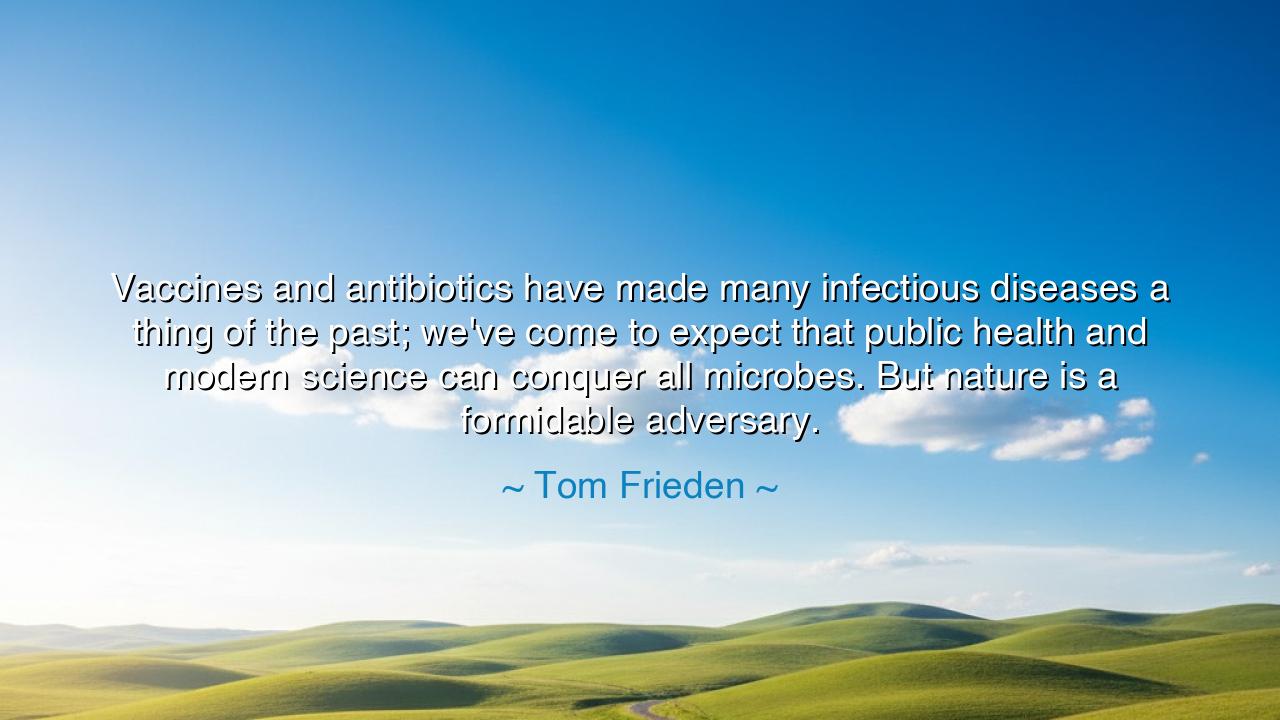
Vaccines and antibiotics have made many infectious diseases a
Vaccines and antibiotics have made many infectious diseases a thing of the past; we've come to expect that public health and modern science can conquer all microbes. But nature is a formidable adversary.






“Vaccines and antibiotics have made many infectious diseases a thing of the past; we've come to expect that public health and modern science can conquer all microbes. But nature is a formidable adversary.” — thus spoke Tom Frieden, a modern healer and guardian of humankind’s well-being. His words rise like a solemn bell through the corridors of time, reminding us that even in our age of brilliance and machines, nature yet holds dominion. This saying is no mere observation; it is a warning born of experience, a call to humility in the face of creation’s vast and untamable power.
For centuries, mankind waged battle against disease — the unseen armies that invaded our bodies, silencing breath and dimming the spark of life. When vaccines and antibiotics were discovered, it seemed as if the age of suffering had ended. Smallpox fell. Polio limped into memory. The fevered nights of plague and pestilence seemed to fade like bad dreams. Humanity, lifted by science, began to believe itself invincible — that the mind of man could conquer all microbes, that no invisible foe could stand against the light of progress. Yet, in that triumph grew a quiet arrogance, a forgetting of the ancient truth: nature is not conquered, only negotiated with.
Remember, children of tomorrow, the tale of the Black Death — when, in the fourteenth century, the earth itself seemed to shudder beneath death’s cloak. No sword could strike it down, no fortress could keep it out. It swept through towns and kingdoms, humbling kings and beggars alike. And though the centuries passed and new medicines were forged, nature’s cunning did not fade. In our own time, we have seen her rise again — in the form of the HIV virus, in the Ebola outbreaks, and most recently, in the COVID-19 pandemic that cast the world into silence. These were reminders — sharp, merciless — that nature, though patient, never sleeps.
Indeed, microbes are not mindless foes. They adapt, they evolve, they transform under the heat of our resistance. The antibiotic, once a weapon of salvation, now sometimes betrays us, for overuse has bred superbugs — creatures shaped by our own hand, immune to our medicine. The circle of cause and consequence turns again, and what was once our victory becomes our vulnerability. Here lies the wisdom in Frieden’s words: that our triumphs, if not tempered with respect and restraint, can sow the seeds of future peril.
But take heart, for this is not a tale of despair. It is a lesson in balance — the harmony between human will and the forces of the earth. We are not meant to dominate nature, but to understand her rhythms, to walk beside her with reverence. The farmer does not command the rain; he learns its season. The healer does not curse the body; he listens to its cries. So too must science learn not only to fight, but to cooperate with the living world, for we are part of it — flesh of its dust, breath of its air.
The lesson is thus: be vigilant, but humble. Celebrate the miracles of medicine, but never believe that knowledge alone makes you godlike. Guard against waste, against the careless use of antibiotics, against the greed that values convenience over caution. Strengthen public health not through pride, but through preparedness and compassion, knowing that the next great storm of disease may come when we least expect it. Let every cure be guided by wisdom, and every discovery by conscience.
And so, to the generations that follow, I say this: honor the science that saves, but also the nature that sustains. For she is both mother and adversary — kind when respected, fierce when defied. If we walk wisely, neither blind to her beauty nor deaf to her warning, then perhaps the balance will hold. But should we forget, should we again raise the banner of arrogance, the earth will remind us — gently if we listen, terribly if we do not — that her power is eternal, and her memory long.






AAdministratorAdministrator
Welcome, honored guests. Please leave a comment, we will respond soon